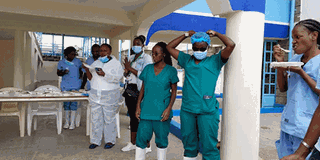Women leadership crucial in Covid-19 fight

Healthcare workers at Mbagathi Hospital, Nairobi where most Covid-19 patients are treated. Majority of frontline healthcare workers are women. PHOTO | POOL | NATION MEDIA GROUP
A section of world leading gender and health researchers and crusaders are calling on governments to involve women more in the fight against the Covid-19.
Jeremy Farrar the Director of the Wellcome Trust and Geeta Rao Gupta, the Executive Director of the 3D Program for Girls and Women say there is need to involve women in to achieve maximum results.
In an article published by the World Economic Forum (WEF), they say women comprise the majority of frontline healthcare workers globally, making their representation vital in tackling the coronavirus crisis.
“Without women in these positions, women's issues could fail to be addressed throughout the crisis,” they say.
They point out that solving health emergencies like Covid-19 demands the best minds the world has to offer in health systems, and side lining women could limit the ability to make life-saving choices.
“Times of crises can accelerate gender inequalities, like access to paid work or leave women vulnerable to poorer health outcomes,” they say.
Wellcome Trust is a global charitable foundation dedicated to improving health by supporting bright minds in science. Ms Gupta is also a senior Fellow at the United Nations Foundation.
The two say that without women in these positions, subsequent decisions will not adequately address hurdles women face.
Last year, the Global Preparedness Monitoring Board co-convened by the World Bank Group and the World Health Organisation (WHO) called for more women leaders as a vital part of preparedness efforts.
However, from the emergencies emanating from Covid-19, the two say it is evident little has been done to ensure women’s voices are reflected at the decision-making table.
The duo notes the move is, however, unsurprising as lack of women in these roles reflects a global health field with stark gender inequalities.
Although women make up 70 per cent of the health workforce, they only comprise 25 per cent of senior leadership positions.
The 2020 Global Health 50/50 report, which evaluates gender parity in global health organisations, shows that decision-making bodies are predominately male, and if current trends persist, gender parity at the CEO level is 40 years away.
Reports from across the world indicate that with families in lock-down worldwide due to Covid-19, domestic violence has been on the rise. Hotlines have been receiving dozens of abuse reports with majority of victims being women and children.
In the US, there was an uproar over the coronavirus task force, which was appointed by President Donald Trump in February for being predominantly men.
The task-force is headed by Vice President Mike Pence who is in charge of the Trump administration’s response to the coronavirus.
Deborah Birx, a physician and diplomat who the Trump administration brought on as its response “coordinator.” is the only woman in the task-force.
The team also includes health secretary Alex Azar and Anthony Fauci, the director of the National Institute of Allergy and Infectious Diseases.
Locally, President Uhuru Kenyatta in February appointed Health Cabinet Secretary Mutahi Kagwe to head the task force mandated to coordinate Kenya’s preparedness, prevention and response to the deadly disease.
Other committee members include Defence Cabinet Secretary Monica Juma, Foreign Affairs Cabinet Secretary Raychelle Omamo, Transport CS James Macharia and ICT CS Joe Mucheru among others.
Maendeleo ya Wanawake (MYWO) Chairperson Mrs Rahab Muiu says there is need for women to lead from the front in the ongoing fight against the disease.
Mrs Muiu says by the virtue of being custodians of families and victims of the disease, women have a major role to play to ensure the fight against coronavirus is won.
“Women should play an integral role in the fight against the deadly disease. They can make the guidelines that have been given out by the government including washing hands, wearing face masks among others, be enforced in homes by their children and husbands,” Mrs Muia notes.
The MYWO Chairperson also calls on women to assist each other during this difficult moment the country and the world is undergoing.
The Group Chief Executive Officer at Breakthrough Leadership Transformation Dr Patricia Murugami observes that women have been hard hit by the pandemic.
Dr Murugami says the impact of Covid-19 has adversely impacted on many women who cannot work from home due to the physical nature of their work.
This, she says, has made women lose income; which is life threatening for most families that survive on under one dollar a day.
UN Women has also issued recommendations, placing women’s needs and leadership at the heart of effective response to COVID-19.
Among the recommendations include ensuring the availability of data on differing rates of infection, differential economic impacts, differential care burden, and incidence of domestic violence and sexual abuse.
The recommendations also entail ensuring priority support is given to women on the front-lines of the response.
“There is need for the protection of essential health services for women and girls, including sexual and reproductive health services and prioritize services for prevention and response to gender-based violence in communities affected by COVID-19,” UN Women says.





